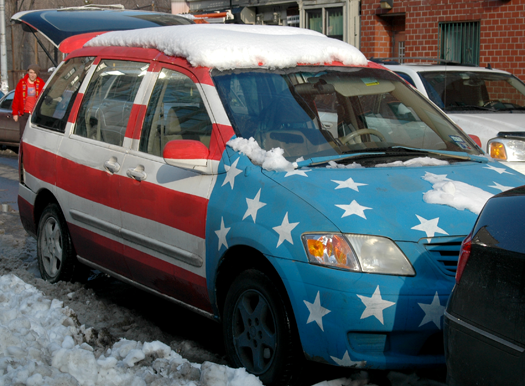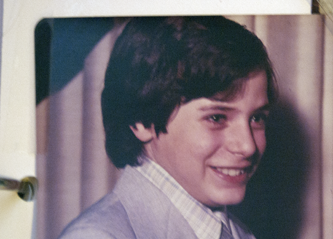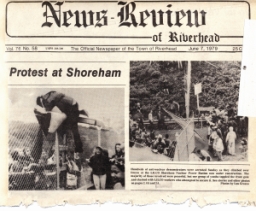--------
Today's post is a long one, so I'm going to start with my daily photo and then get to today's story.
god bless americar?

------
Looking back, I'm still not sure what was going through my head when I decided to climb the fence, but I did. As a result, my first political protest ended with me handcuffed, packed in a school bus full of other arrested protesters on our way to be processed, joyously singing "we all live in a yellow submarine."
My path to handcuffs started with the drama of the Three Mile Island nuclear plant accident. I think I might have never noticed; I would have never paid attention to the news; I would have continued on with my boring suburban life had the timing not been what it was.
Like many in my generation, I was introduced to the existence of nuclear power by the release of the movie The China Syndrome in March '79. Like most in my generation, it meant nothing to me.
When the movie ended up being mirrored by reality in late March and early April, it did catch my attention but I probably would have not given it much thought if it was not for the fact that it threatened to interfere with my own life.
 My Bar Mitzvah was scheduled for April 7th 1979. Some of my relatives would have to travel past the troubled Pennsylvania reactor. There was talk of them having to cancel the trip. As the crisis escalated, there was even some talk of having to cancel the event altogether. No one really knew what would happen if they did not get the reactor under control.
My Bar Mitzvah was scheduled for April 7th 1979. Some of my relatives would have to travel past the troubled Pennsylvania reactor. There was talk of them having to cancel the trip. As the crisis escalated, there was even some talk of having to cancel the event altogether. No one really knew what would happen if they did not get the reactor under control.
My Bar Mitzvah happened, all the guests showed up. I read from the Torah while radioactive gases were being vented into the air to keep the reactor from blowing up. My life was changed, I wandered down the road less traveled. I now paid attention to the news; I was concerned about politics and the environment. I became an activist.
When I learned that there was a nuclear power plant being built 25 miles from my home, I was freaked out. When I heard that a large coalition had formed and was organizing a protest, I decided to go.
Sunday, June 3rd 1979 was a miserable rainy day. I had heard on the radio (my introduction to WBAI, a station that would become the background noise to so much of my later life) that the protest organizers were going to have a couple of vans at the Port Jefferson and Riverhead Long Island Railroad stations to take people arriving on one or two morning trains to the beach where the protest was going to happen. My bicycle took me through the pouring rain a mile or two to the closest LIRR station.
 An hour later, the rain had let up a bit and I was in the middle of a 15,000 person crowd. I listened to some folks talk about how important it was to prevent the completion of the plant; I heard Pete Seeger play for the first time. The energy was amazing. I shouted and chanted along with the crowd. I felt I was participating in history.
An hour later, the rain had let up a bit and I was in the middle of a 15,000 person crowd. I listened to some folks talk about how important it was to prevent the completion of the plant; I heard Pete Seeger play for the first time. The energy was amazing. I shouted and chanted along with the crowd. I felt I was participating in history.
10 years later, when I was Production Manager of The Guardian Newsweekly, Pete Seeger showed up to say hi and entertain us as we got that week's paper ready to go to press. I was so in awe, I never got up the courage to tell him this story.
But, to get back to 1979: Just about the time it got brutally boring, we started to march. We marched along beside the fence surrounding the plant. Suddenly, people started climbing the fence.
It took me by surprise, but this was not a spontaneous action -- it was well planned. Some secret signal had been given and it seemed everyone but me knew what to do next. People had ladders, some of them home made out of rope and planks of wood. At another part of the march, what the NY Times called a "militant splinter group" of 20 people "stormed the main gate, removed the holding pins from the hinges and sent it crashing to the ground."
Where I was it was more mellow. Someone put a wooden ladder against the fence, a piece of carpet over the barbed wire and people started flowing over the fence.
I did not think too much about it, it looked like fun. It seemed to be the right thing to do. It was a symbolic but defiant action of resistance and protest.
Next thing I knew, I was over the fence. As my feet hit the ground, I realized that I had no clue what the hell I was doing. I had no plan. "Oh crap, what the hell do I do now?"
Before I could answer that question in my own head, two cops grabbed me and politely asked me to come with them. I was under arrest. I was 13, my parents had no clue where I was and I had no desire to tell them.
The mood on the buses of arrestees -- The NY Times and Newsday reported that over 600 people were detained or arrested -- was joyful. Singing, celebrating, chanting, swaying back and forth rocking the bus on its aged shocks.
 When we got off the bus, the reality hit me. I was actually under arrest. They explained to the group that as long as we gave them our names, we would be given a summons and let go. If we refused to give our names, they would hold us on additional charges.
When we got off the bus, the reality hit me. I was actually under arrest. They explained to the group that as long as we gave them our names, we would be given a summons and let go. If we refused to give our names, they would hold us on additional charges.
When my turn came, a cop sat me down and asked me for my name. I was terrified. I did not want to be put in jail, I did not know what would happen, but all that paled compared to my fear of my parents finding out -- there was no way in hell I was going to give them my name and my parent's phone number. "Just let me call your parents and they can come pick you up," the officer pleaded with me. I refused. No matter what they would do to me it was nothing compared to what my parents would do to me if they found out where I was and that I was under arrest. My last name is not common, so just that info would lead them to the only Goldhagen in the phonebook and that would lead towards nothing good. "I'm sorry sir, but I will not answer your questions," I repeated.
They were getting frustrated. I was put in a chair facing the corner. I guess they figured that eventually I'd get hungry or scared enough to cooperate. I was probably just about to break when a miracle happened.
One of the people that was on the bus with me, who while being processed heard my conversation with the cops, burst into the holding area with her partner. "Where is he!" "I'll wring his little neck" "I told him to stay out of trouble" he was shouting as she played along trying to calm him down.
Knowing nothing but my first name, they convinced the cops that they were my parents, and that if the police released me into their custody they would certainly teach me a lesson I would never forget. (I can assure you that they did, and I never will).
I think the cops just wanted me out of their way, so they handed me over to my "parents." As soon as we were out of the building, their "anger" turned into hysterical laughter. I had been un-arrested by strangers who now were offering to buy me dinner and drive me home -- along the way getting me stoned out of my mind.
I rode my bike back home from the LIRR station feeling like I was flying high above the roadway. I had discovered a place out of the mainstream where I felt alive; where over the years I would be challenged to learn, develop a clear understanding of the issues and my own political power.
In the years that followed, I testified at two public hearings held by the Nuclear Regulatory Commission (NRC) and continued to participate in the protests against the Shoreham power plant.
Our best point of attack was about evacuation. Most of the people that would need to be evacuated in case of an emergency, due to the nature of Long Island geography would have to either pass closer to the danger zone or somehow be taken by boat across the Long Island Sound.
At one of the NRC hearings, I was scheduled to talk right after the lunch break. The commissioners returned 45 minutes late -- they apologized and explained that they got stuck in traffic coming back from lunch. Instead of my prepared speech, I taunted the panel. They could not even get 3 miles during the middle of the day and they expected it to be possible to move half the population of Suffolk County on those same roads quickly and orderly in a crisis.
Finally, in 1983, the Suffolk County Legislature decided in a 15-1 vote that the county could not be safely evacuated and Governor Mario Cuomo ordered state official to not approve any evacuation plan sponsored by the Long Island Lighting Company (LILCO).
This would all have a happy ending if not for the reality of the Political Power of LILCO. It was clear to everyone involved that they would never ever get a license for the plant. It was clear that we had won.
There was a chance that the structure could be used for some other purpose. However, in 1985 the federal government gave LILCO permission to bring the plant online for "testing." After that, the building could never be used for something else. If it is ever torn down it now must be disposed of as hazardous, radioactive waste.
Then, as a final insult, in 1989 Cuomo and LILCO announced the closure of the plant -- which involved the state taking over the plant and then attaching a 3 percent surcharge to Long Island electric bills for 30 years to pay off the $6 billion price tag caused by the arrogance of LILCO and the NRC.
That day in 1979 was the start of my life as an activist and the beginning of the end of the Shoreham Nuclear Power Plant. I'm still active and sadly so is it.



Recent comments
13 years 2 weeks ago
13 years 50 weeks ago
13 years 51 weeks ago
13 years 51 weeks ago
14 years 7 weeks ago
14 years 7 weeks ago
14 years 7 weeks ago
14 years 8 weeks ago
14 years 8 weeks ago
14 years 20 weeks ago